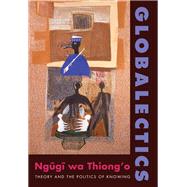Globalectics
, by Ngugi wa Thiong'o- ISBN: 9780231159500 | 0231159501
- Cover: Hardcover
- Copyright: 12/30/2011
A masterful writer working in many genres, Ngugi wa Thiong'o entered the East African literary scene in 1962, with the performance of his first major play, "The Black Hermit," at the National Theatre in Uganda. In 1977, he was imprisoned after his most controversial work, "Ngaahika Ndeenda" ("I Will Marry When I Want"), was produced in Nairobi, sharply criticizing the injustices of Kenyan society and unequivocally championing the causes of ordinary citizens. Following his release, Thiong'o decided to write only in his native Gikuyu, communicating with Kenyans in the language of their daily lives. Today he is known as one the most outspoken intellectuals working in postcolonial theory and the global postcolonial movement. In this volume, Thiong'o encapsulates and develops a cross-section of the issues he has grappled with in his work, which deploys a sophisticated strategy of imagery, language, folklore, and character to "decolonize the mind." Thiong'o confronts the politics of language in African writing; the problem of linguistic colonialism and literature's ability to resist it; the difficult balance between orality, or "orature," and writing, or "literature;" the tension between national and world literature; and the role of the literary curriculum in both reaffirming and undermining the dominance of the western canon. Throughout, Thiong'o engages a range of philosophers and theorists who write on power and postcolonial creativity, including Hegel, Marx, Claude Lévi-Strauss, and Aimé Césaire, yet his explorations remain grounded in his own experiences with literature (and orature), rendering the difficult dialectics of theory in richly evocative prose.







